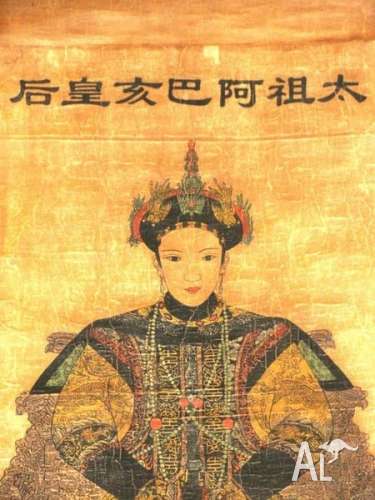Lady Abahai
| Empress Xiaoliewu | |||||||||
|---|---|---|---|---|---|---|---|---|---|
 | |||||||||
| Born | 1590 | ||||||||
| Died | 1 October 1626 (aged 35–36) | ||||||||
| Spouse | Nurhaci | ||||||||
| Issue |
Ajige Dorgon Dodo | ||||||||
| |||||||||
| House |
Ulanara (by birth) Aisin Gioro (by marriage) | ||||||||
| Ulanara Abahai | |||||||
| Traditional Chinese | 烏喇那拉·阿巴亥 | ||||||
|---|---|---|---|---|---|---|---|
| Simplified Chinese | 乌喇那拉·阿巴亥 | ||||||
| |||||||
Empress Xiaoliewu (1590 – 1 October 1626), personal name Abahai (Manchu:ᠠᠪᠠᡥᠠᡳ, Mölendroff: abahai) of the Ulanara clan, was the fourth primary consort of Nurhaci, the Khan of the Later Jin dynasty (precursor of the Qing dynasty). She bore Nurhaci three sons: Ajige, Dorgon and Dodo. She was erroneously identified with Hong Taiji, Nurhaci's eighth son and successor, in earlier sources.
Life
Abahai was born in the Manchu Ula clan, a subgroup of the Nara clan. Her father was Mantai (滿泰), a beile of the Ula clan. Under the arrangement of her uncle Bujantai, Abahai married Nurhaci in 1602 when she was 12 years old. Following the death of Nurhaci's secondary consort Lady Yehenara in 1603, Abahai became Nurhaci's Grand Consort (大妃). She was forced to commit suicide on 1 October 1626 by her stepsons (including Hong Taiji) because they feared that she might be a barrier to Hong Taiji's succession. Hong Taiji later granted her the posthumous title "Empress Xiaoliewu".
During the early reign of the Shunzhi Emperor (r. 1643–1661), Abahai's second son, Dorgon, served as Prince-Regent for the underage emperor. After Dorgon's death in 1650, the Shunzhi Emperor revoked Abahai's posthumous title.
Issue
- Ajige (阿濟格; 28 August 1605 – 28 November 1651), Nurhaci's 12th son
- Dorgon (多爾袞; 17 November 1612 – 31 December 1650), Nurhaci's 14th son, granted the title Prince Rui of the First Rank in 1636, posthumously honoured as Prince Ruizhong of the First Rank
- Dodo (多鐸; 2 April 1614 – 29 April 1649), Nurhaci's 15th son, granted the title Prince Yu of the First Rank in 1636, posthumously honoured as Prince Yutong of the First Rank
See also
Notes
References
- Hummel Sr., Arthur W., ed. (1943). "Abahai". Eminent Chinese of the Ch'ing Period. United States Government Printing Office.
- Zhao, Erxun (1928). Draft History of Qing (Qing Shi Gao) (in Chinese). Volume 214.
| Preceded by Dynasty created |
Empress of the Qing dynasty
(granted posthumously in 1626) |
Succeeded by Empress Xiaocigao |